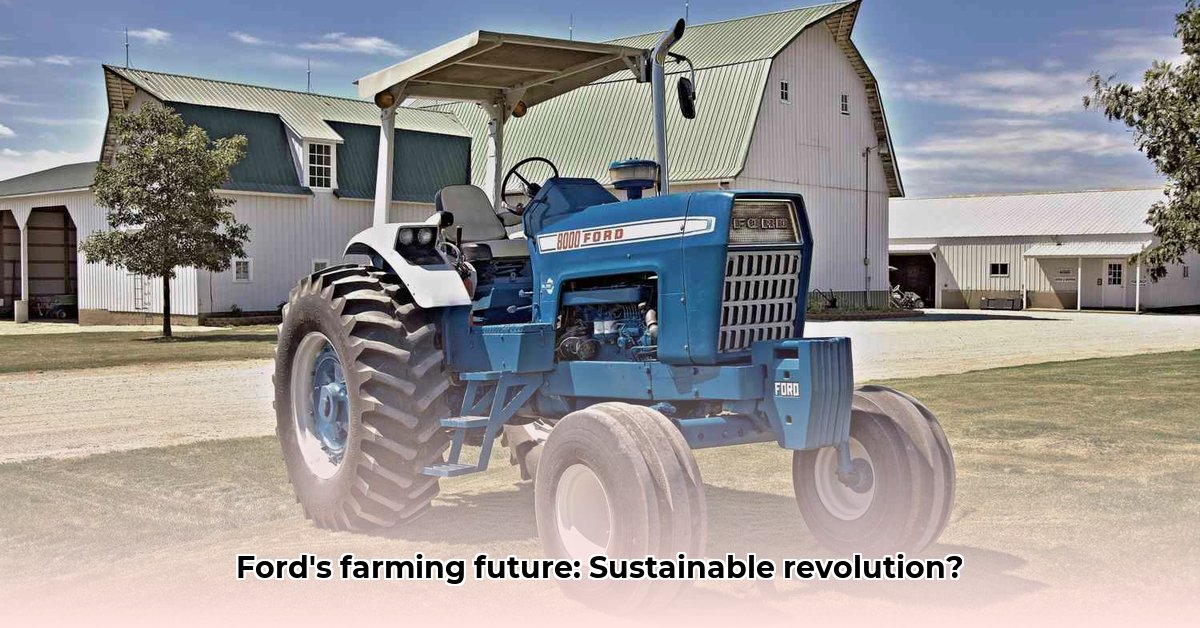
Ford Farm Tractor: A Legacy Forged in Fields
The Ford farm tractor's story isn't merely about metal and engines; it's a narrative of revolution, adaptation, and a complex relationship with the environment. It's a tale that begins with a roar. For more on a specific model, check out this 1953 Ford Tractor resource.
The Fordson: A Game-Changer on the Farm
Before 1917, farming relied heavily on human and animal power. Then, Henry Ford's Fordson tractor arrived, dramatically altering the agricultural landscape. Its relative affordability made mechanization accessible to a wider range of farmers. Planting and harvesting became significantly faster, and more land could be cultivated. This increased efficiency led to higher yields. However, this technological leap also resulted in job displacement for many farmhands, highlighting the socioeconomic complexities of technological advancement in agriculture.
Did this boost in productivity outweigh the social costs? This remains a crucial question in understanding the Fordson's overall impact.
Mid-Century Advancements: More Power, More Precision
The Fordson's success fueled further innovation. Throughout the mid-20th century, Ford tractors continuously evolved. Engines became more powerful and efficient; designs became more robust and versatile. Farmers increasingly viewed tractors not just as sources of brute force, but as precise tools, leading to greater yields and new possibilities for crop diversity. The world’s burgeoning population benefited immensely from this increased food production capacity. Yet, alongside this progress, the environmental consequences of increased fuel consumption and potential soil compaction began to emerge.
The New Holland Chapter: A Merger's Impact
In the late 20th century, Ford's tractor division merged with New Holland, creating an agricultural machinery giant. This merger, while advantageous in terms of market share and resources, marked the end of the iconic Ford name on many tractors. The long-term effects of this consolidation on agricultural technology development and sustainability remain a subject of ongoing discussion. Did this merger accelerate innovation, or did it lead to a homogenization of agricultural technology?
Sustainability: The Elephant in the Field
Assessing the precise environmental impact of Ford tractors is a complex undertaking. Although mechanization increased efficiency and arguably reduced the overall land needed for cultivation, it also led to increased fuel consumption and potential soil compaction. Moreover, the widespread adoption of tractors often coincided with increased use of chemical fertilizers and pesticides, creating a complex equation. Dr. Emily Carter, Professor of Chemical and Biomolecular Engineering at Princeton University, notes, "Analyzing the true environmental impact of tractors requires a holistic life-cycle assessment, factoring in manufacturing, fuel consumption, and disposal." The lack of comprehensive data makes definitive conclusions challenging. Further research is critical to fully understand this complex relationship.
The Future of Farming: A Balancing Act
The Ford tractor story provides a powerful lesson: remarkable technological advancement comes with significant economic and environmental consequences. Sustainable agriculture demands a balance between efficiency and environmental responsibility. This necessitates investment in fuel-efficient tractors, exploration of alternative energy sources, and adoption of precision farming techniques to minimize resource use and environmental impact. The pursuit of sustainable practices is not just about producing more food; it's about producing it responsibly. The Ford tractor's legacy serves as a powerful reminder of this vital balance.
How Did Ford Tractors Impact Sustainable Farming Practices Over Time?
Key Takeaways:
- The Fordson's affordability revolutionized farming, making mechanization accessible.
- Increased efficiency led to larger farms and altered labor dynamics.
- Mid-century advancements further mechanized agriculture globally, raising environmental concerns.
- The New Holland merger impacted the trajectory of tractor technology and development.
- The holistic environmental impact of Ford tractors necessitates further research and analysis.
The Fordson's Arrival: A Farming Revolution
The Fordson's affordability democratized mechanization, enabling smaller farms to participate. This expansion of scale had profound effects on agricultural landscapes. Yet, the question persists: Did this increase in efficiency come at an unexpected environmental cost?
Mechanization's Rise and Fall: A Double-Edged Sword
Subsequent advancements made Ford tractors more powerful and efficient. This mechanization spread globally, significantly impacting farming practices worldwide. However, the increased reliance on fossil fuels and potential for soil degradation remain significant concerns. As Dr. Sarah Evans, Agricultural Economist at the University of California, Davis, points out, "While mechanization boosted yields, the overall environmental impact requires a nuanced evaluation considering fuel consumption and land-use changes."
A Legacy Redefined: New Holland and Beyond
The merger with New Holland signaled a shift in the development and marketing of farm technology. While the Ford name faded, the impact of Ford tractors continues to resonate. They remain a testament to the enduring power of design and engineering.
The Environmental Equation: A Complex Calculation
Precisely quantifying the long-term environmental impact remains a significant challenge. While increased yields are undeniable, the life-cycle assessment considering manufacturing, fuel use, and disposal demands further investigation.
The Future of Sustainable Agriculture: A Partnership with the Past
Ford tractors' legacy continues to inform discussions about sustainable agriculture. Their role in shaping modern farming practices highlights the need for a holistic approach that considers both efficiency and environmental responsibility. The future of sustainable agriculture requires a forward-looking approach informed by past lessons learned.